Question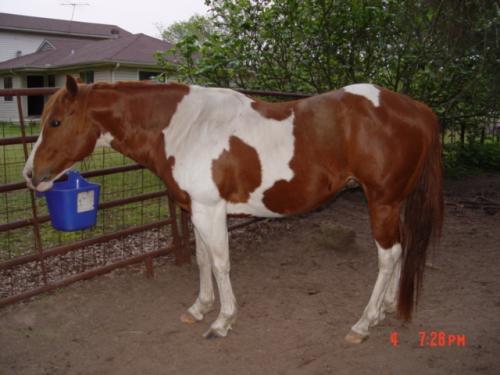 Reble
Reble
QUESTION: Need all info about HYPP and what it is.
We just got a 11y/o paint gelding that is not broke to ride and he has HYPP and we now what it is kind of is but want more info about it and what would be great to feed him.
So can you help me please.
Thanks,
Rachael
ANSWER: Dear Rachael:
HYPP stands for Hyperkalemic Periodic Paralysis. This is a genetic disease that is passed from the sire or dam or both. It causes brief periods of abnormally very high potassium in the blood that leaks from the muscle in affected horses. Because potassium is intimately connected with muscle (and nerve) stimulation, the result is loss of the ability to stimulate the muscle due to the very high levels of potassium that are now OUTSIDE of the muscle cells (because of the leakage from inside the cells). Indeed this disease is directly realted to the membrane pump that keeps the potassium within the cell- this is the site of the genetic defect.
This disease is caused by the transmission of the trait genetically. Horses with the disease are either "homozygous" or "heterozygous" for this disease. These terms refer to the type of gene signal from each parent. If the defective gene signal is passed from only one parent, the horse is termed heterozygous for this disease because one gene signal from one parent is normal and the other gene signal from the other parent is the abnormal or defective gene signal. A homozygous horse is one that the gene signal from BOTH parents is for the abnormal or defective gene signal. Finally, a horse that does not have any abnormal gene signals from either parent is also a "homozygous" horse- for the NORMAL gene signals, that is BOTH gene signals from the 2 parents are normal. You should also realize that any horse with any abnormal gene signal for this disease can pass this on to its offspring. Horses that are heterozygous for this disease (one abnormal gene signal and one normal gene signal)are less severely affected than horses with abnormal gene signals from each parent (a homozygous affected horse). I recommend getting your horse tested for this disease. A DNA test can be done easily and it identifies those horses with this gene defect and tells you if your horse is homozygous or heterozygous for the disease- if it is present. The test can be run on whole blood or hair from the mane with the follicle attached. Your veterinarian can easily get these samples for you to send for testing, usually to University of California, Davis.
If your horse has this diease, you will see intermittent episodes of muscle trembling and weakness that can be mistaken for seizures or another neurologic problem. Again, if the horse is heterozygous, these episodes are generally less severe. You can effectively manage these episodes by doing something as simple as feeding your horse sweet feed. The natural response to feeding is a release of insulin by the pancreas. Insulin works to drive sugar (glucose) into the body cells, and with this action, it will also drive potassium back into the cells, lowering the potassium levels outside in the blood and outside of the cells. For more severe epidoses, your vet may need to give IV glucose (dextrose) for the same reason but it works faster. On occasion, other treatments are also necessary to speed the response, they may include intravenous bicarbonate and intravenous calcium. All of these treatments serve to lower the blood potassium to normal and stop the weakness, trembling and other signs. For horses that are homozygous (both gene signals are abnormal)the signs of an "attack" are more severe and can lead to the horse falling down and even to upper respiratory paralysis and obstruction. The faster acting treatments are often necessary in these situations.
Control of the condition is easiest for horses that are heterozygous Heterozygous horses can be used regularly for many types of sporting competitions. Control is focused on feeding feeds that are low in potassium and avoiding feeds high in potassium. Alfalfa hay should be avoided. Oats and bland feeds usually have lower potassim than fortified synthetic feeds. For horses that have frequent episodes, preventive treatment with a diuretic called acetazolamide is helpful, because this diuretic causes loss of potassium in the urine. There may even be commercially available feeds now available specifically for this condition since it is so common in Quarter Horses, Paints and related horses. Ask your feed store about this. Exercise is fine and probably helpful in some horses. In severe horses, exercise may precipitate the episodes. If you have a homozygous horse with this genetic defect, Realistically, you're in for difficulty when it comes to being able to use him for much exercise and sporting competition. I dont really recommend it. Unless the horse is remarkably talented in the sport, in my opinion, it won't be worth the effort to maintain him.
Good luck with this, Get him tested so you know what to expect and what to do for him. Im sure you'll have other questions. Just ask any time.
---------- FOLLOW-UP ----------
QUESTION: ok
all the seller said that he had he was test and he had HYPP.
so should I ask him first.
and if he does have can he still be riden around about 1 hour or so or less
AnswerYes. you need to ask if the horse is heterozygous or homozygous for the disease. I would be careful with him if he is homozygous for this disease. Maybe start by lunging this horse before you try getting on him and riding. If you see an episode, start him on the acetazolamide under the supervision of your regular veterinarian before you try any riding. If he is homozygous, you may need to be prepared to significantly reduce your expectations for his ability to perform. Again, find out if he is heterozygous or homozygous. If he is heterozygous, i'd go on with him as normal, but treat him with the acetazolamide if you require him to work alot and he shows any episodes. Feed low potassium containing feeds and hays, avoid alfalfa.


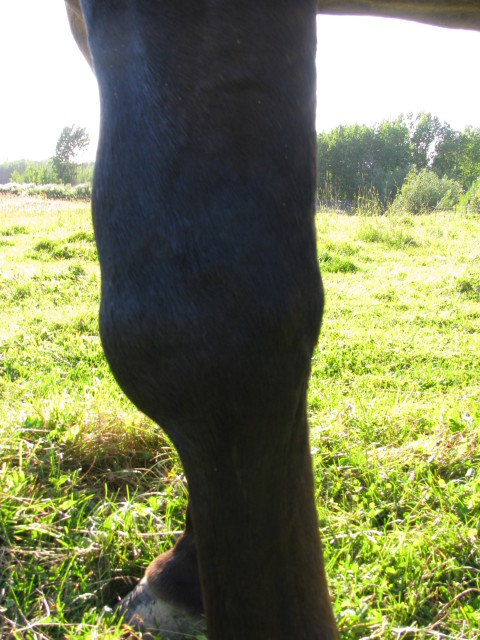 Swollen Knee
Question
horse
Hello Judi,
I live in Canada and
Swollen Knee
Question
horse
Hello Judi,
I live in Canada and
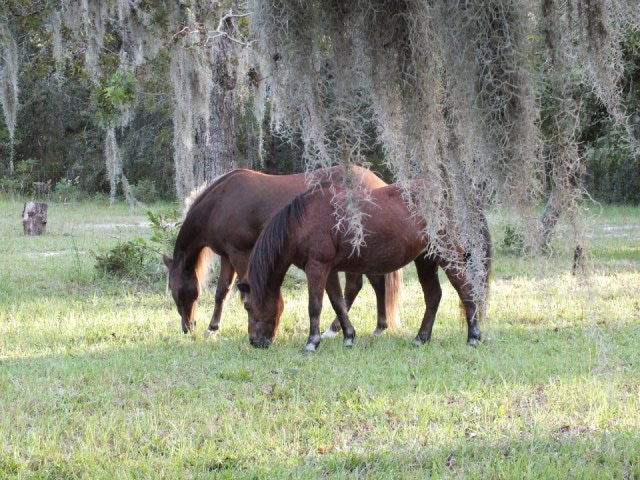 pony mares - Rick Gore Horsemanship
Question
Millie and Angel Millie and Angel
pony mares - Rick Gore Horsemanship
Question
Millie and Angel Millie and Angel
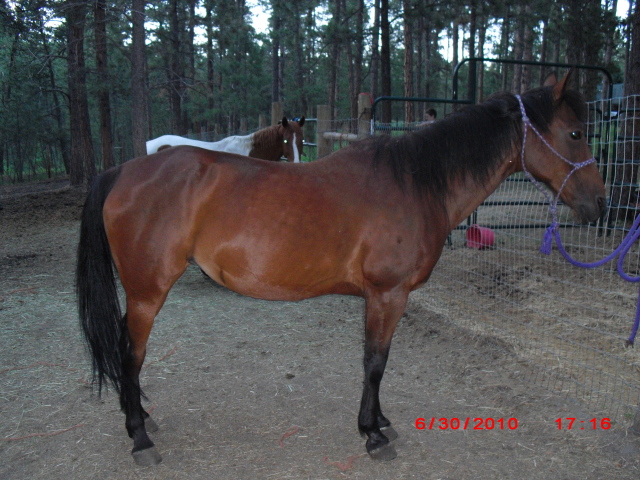 Mystery Mare
Question
Bay Mare
Hi there, I was curious if you could
Mystery Mare
Question
Bay Mare
Hi there, I was curious if you could
 A horse that doesnt like to be around unfamiliar horses
QuestionCruiser
QUESTION: Im 53, I have about a
A horse that doesnt like to be around unfamiliar horses
QuestionCruiser
QUESTION: Im 53, I have about a
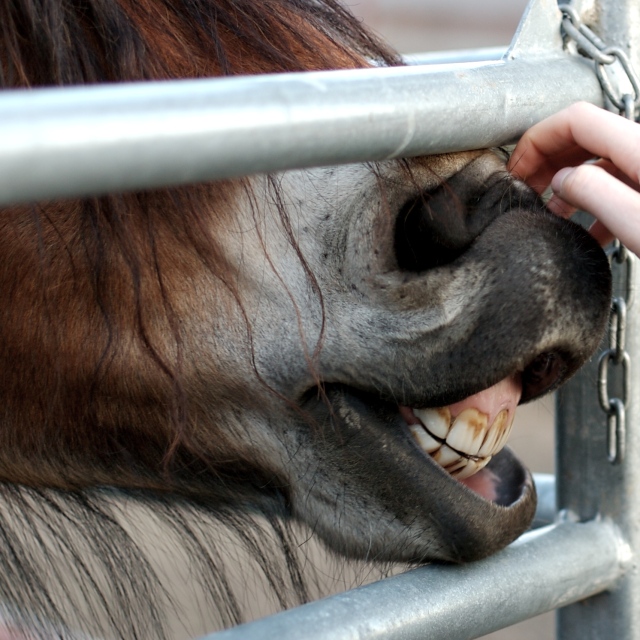 horse age
Question
horse age
hello, can you guess the horse age?
horse age
Question
horse age
hello, can you guess the horse age?